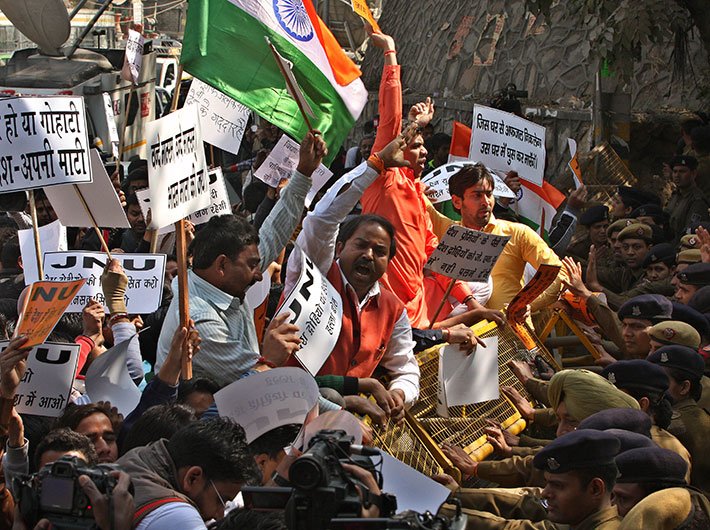“JNU is the other Red Fort of Delhi”
Compared to the most of India, the university certainly has a far higher proportion of people with leftist inclinations. But there are three (or more) parties on the left, some of which treat some others as their first rivals. The student wings of CPM and CPI (namely, SFI and AISF) are mostly together, but the student wing of the CPI-ML (AISA) has more radical positions, usually in critical of that duo, and then there are more radical groups though with very poor cadre strength. Notably, the Congress’s student wing NSUI never has had much of a space in the campus, while the BJP’s (or actually RSS’s) student wing ABVP has notable presence. During the 1990s, ABVP even won all four top positions in the student union elections, stunning all – as the left vote was divided among various entities. Today, one of the four posts is held by ABVP. Then there are those who don’t fall into party lines. On and off, formally and otherwise, “Free-thinkers” have been a veritable force in JNU politics.
Thus, when BJP leaders like Sadhvi Prachi talk of JNU as a hotbed of “anti-nationals”, they are forgetting that Nirmala Sitharaman, one of the few articulate people in the Modi cabinet, is a JNU alumnus. Also, BJP leader, Udit Raj, another former student of JNU, expressed his deep concern over the whole controversy. “We do not concur with the claim that JNU is a campus of anti-national activity,” said Raj at a press conference held recently.
“So all JNU students are into politics, left or right”
Actually, not even one-third of them do so, as at least one-third of them are busy preparing for UPSC and other competitive exams. JNU has been a favourite hub for all those from upcountry targeting the civil services. So much that the reading room of the JNU library, in the local lingo, is called the Dholpur House – in reference to the building that houses UPSC offices. So, apart from producing “anti-nationals”, JNU has produced a high proportion of civil servants and diplomats – including the current foreign secretary S Jaishankar and the high-flying DIPP secretary Amitabh Kant.
READ: An intelligent citizen’s guide to the JNU row
JNU is also home to a large section of creative minds – some of the most respected names in Hindi literature and criticism, for example, are in the campus. So are some of the brightest and much-awarded scientists.
“But at any rate, JNU is misusing taxpayers’ money for politics”
This argument has come from T Mohandas Pai, an otherwise responsible business leader. He has written: “As for JNU, it is time the government asked students to pay the full cost of education; in case students wish to focus on politics and not on their studies, there is no case for taxpayers to subsidise extreme views or an archaic Left.” Mohandas Pai, who was in charge of education and research at Infosys and now heads Manipal Global Education, of course knows that JNU gets only as much funding from the taxpayers as any other university, and that money goes to educate and empower just about as many students from marginalised sections as at any other university. If a poor farmer’s son has to refrain from politics in order to study and if study has to mean only textbooks and no connect with society, Rohith Vemulla was dreaming wrong dreams.
Also, Mohandas Pai is against subsiding “archaic left”, and not the ultra-archaic right. Otherwise, the argument would go against the right-wing student wing politics, and questions would be raised who was financing Arun Jaitley’s education when he was actively protesting the Emergency.


